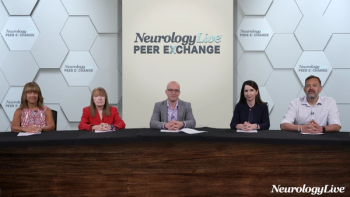
Key opinion leaders provide insights into the prevalence and incidence of clinically isolated syndrome (CIS) within their clinical practice.

Key opinion leaders provide insights into the prevalence and incidence of clinically isolated syndrome (CIS) within their clinical practice.

The panelists explore diagnostic methods for differentiating between mild and moderate multiple sclerosis (MS) while also examining prognostic factors, the role of imaging, and the concept of brain reserve in mild MS cases.

Multiple sclerosis (MS) specialists discuss their observations regarding variations in MS presentation and progression among patients of Different Races and Ethnicities

The expert panel examines early multiple sclerosis (MS) and patients with mild MS even in later stages of the disease, emphasizing crucial information to convey to patients throughout their journey; faculty also explore cases where disease-modifying therapies (DMTs) may not be utilized.

The key opinion leaders provide recommendations on the optimal frequency for evaluating disease progression in patients with mild to moderate MS, emphasizing effective monitoring methods and the most appropriate tools for best clinical practice.

The panel reflects on their experiences as practicing clinicians, emphasizing the significance of shared decision-making and actively listening to patients’ preferences regarding management of their MS.

Multiple sclerosis (MS) treatment specialists discuss the challenges associated with the early use of high-efficacy therapy (HET) in patients with mild to moderate MS and delve into the broader debate surrounding the consistent use of HET for managing mild to moderate MS cases.

Key opinion leaders share their approach to treatment sequencing for patients with multiple sclerosis (MS), taking into account comorbidities such as cardiovascular diseases, risk of infection, liver damage, and cancer as well as considering factors like planned pregnancy or advanced age.

The panel explores factors influencing treatment adherence in multiple sclerosis (MS) patients and highlights the importance of shared decision-making in promoting and maintaining patient adherence to their prescribed therapy.

Medical experts debate the concept of benign multiple sclerosis (MS), questioning whether this subtype truly exists or if it is a misnomer in the context of the disease's long-term progression and impact on patients.

The panel identifies and discusses the unmet needs of patients with mild to moderate multiple sclerosis (MS), highlighting areas where current treatment options and management strategies fall short in addressing the unique challenges faced by this patient population.

Key opinion leaders explore the impact of newly available biosimilars and generic biologics for managing multiple sclerosis (MS), discussing how these developments have altered patient access to treatments and the implications for the future of the MS treatment landscape.

Key opinion leaders examine the available data on Bruton tyrosine kinase (BTK) inhibitors to assess whether the evidence supports their efficacy as a treatment option for multiple sclerosis (MS).

In closing, the panel of experts in multiple sclerosis (MS) offer their insights and recommendations for clinicians, emphasizing best practices to optimize patient care and improve overall outcomes in the management of MS.